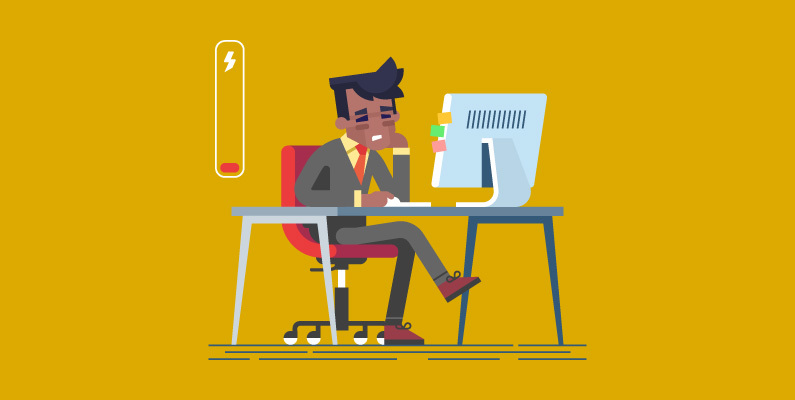- Empty cart.
- Continue Shopping
How to Recognize the Early Signs of Burnout

In our fast-paced, high-pressure world, burnout has become an increasingly prevalent issue. Burnout is not just a feeling of exhaustion; it’s a state of physical and emotional depletion that can have serious consequences for your health and well-being. The key to preventing burnout is to recognize the early signs and take proactive steps to address them.
Understanding Burnout
Burnout is more than just feeling tired or stressed. It’s a specific syndrome characterized by a combination of emotional exhaustion, depersonalization (a sense of detachment from your work or responsibilities), and reduced personal accomplishment. Burnout typically occurs in response to chronic workplace stress, but it can also result from other life situations, such as caregiving or personal stressors.
Early Signs of Burnout
Recognizing the early signs of burnout is crucial for preventing it from escalating into a full-blown crisis. Here are some common indicators to watch out for:
1. Chronic Fatigue
Feeling tired is a common symptom of many conditions, but chronic fatigue that doesn’t improve with rest is a significant early sign of burnout. You may find it increasingly difficult to muster the energy to complete tasks, both at work and in your personal life.
2. Increased Irritability and Impatience
Burnout can lead to heightened irritability and impatience. You may notice that you’re snapping at coworkers, friends, or family members more often. Small annoyances that you used to handle with ease now seem overwhelming.
3. Reduced Concentration
Burnout can impair your ability to concentrate and make decisions. You might find it challenging to focus on tasks, leading to decreased productivity and increased frustration.
4. Physical Symptoms
Physical symptoms, such as headaches, gastrointestinal issues, and muscle tension, can be early signs of burnout. The stress associated with burnout can manifest in various physical ailments.
5. Neglecting Self-Care
When burnout is on the horizon, people often neglect self-care practices that used to bring them joy or relaxation. You might stop exercising, eating poorly, or avoiding activities that once brought you happiness.
6. Emotional Exhaustion
Emotional exhaustion is a hallmark of burnout. You may feel emotionally drained, as if you have nothing left to give, whether at work or in your personal life.
7. Cynicism and Detachment
Burnout can lead to a sense of cynicism and detachment from your work or responsibilities. You might find yourself becoming apathetic, questioning the value of your work, or emotionally distancing yourself from colleagues and loved ones.
8. Reduced Sense of Accomplishment
You may start to doubt your abilities and experience a reduced sense of accomplishment. Even small tasks can feel insurmountable, and you may no longer derive satisfaction from your achievements.
Taking Action
Recognizing these early signs of burnout is the first step in preventing it from worsening. If you notice these indicators in your life, here are some steps you can take:
1. Self-Assessment
Take a moment to evaluate your current situation. Are you experiencing any of the early signs of burnout? Acknowledging the issue is the first step towards addressing it.
2. Seek Support
Talk to a trusted friend, family member, or colleague about what you’re going through. Sometimes, simply sharing your feelings and concerns can provide relief and perspective.
3. Set Boundaries
Review your work and personal commitments. Are you taking on too much? Consider setting clear boundaries to protect your time and energy.
4. Prioritize Self-Care
Recommit to self-care practices that nourish your physical and emotional well-being. This may include regular exercise, a balanced diet, adequate sleep, and relaxation techniques like meditation or deep breathing.
5. Seek Professional Help
If you’re unable to manage the early signs of burnout on your own, consider seeking help from a mental health professional. They can provide strategies and support to help you cope with and prevent burnout.
6. Talk to Your Supervisor
If work-related stress is a significant contributor to your burnout, have an open and honest conversation with your supervisor. They may be able to help you reorganize your workload or provide additional resources.
7. Consider a Break
In some cases, a temporary break from work or your responsibilities may be necessary to recover from burnout. Don’t hesitate to explore options like taking vacation time or a medical leave if needed.
Finally, Recognizing the early signs of burnout is essential for maintaining your physical and mental health. Burnout can have a profound impact on your well-being, productivity, and relationships. By paying attention to the warning signals and taking proactive steps to address them, you can prevent burnout from taking hold and enjoy a healthier, more balanced life. Remember that seeking help and support is a sign of strength, not weakness, and it’s a crucial part of the journey toward recovery and resilience.








